IELTS Speaking Common Topics With Answers: In this article, I will give you 15 of the most common IELTS speaking questions with some awesome answers. These 15 questions are probably the most common questions we get in IELTS speaking, particularly part one. But these are also just very common questions in everyday life. For each question, I’ll give you my answer just to give you a flavour of a possible answer. I’ll also mark in bold some of the key vocabulary, grammar or pronunciation to help you learn and improve.
IELTS Speaking Common Topics With Answers
- What do you do?
- Do you like your job?
- What job would you like to do?
- What do you study/ what are you studying at the moment?
- What kind of accommodation do you live in?
- Which part of your home do you like most?
- What do you do in your free time?
- Do you prefer to spend time with friends or family?
- What’s your morning routine?
- How do you stay fit and healthy?
- Did you do any sports as a child?
- What kind of music do you like?
- What’s your favourite kind of weather?
- Which city would you like to visit in the future?
- Are clothes important to you?
Now, if you are preparing for IELTS, please do not learn and copy these answers. That is not going to help you. Trust me. Learn the vocabulary, learn the phrases and the chunks and then use those to make your own original answer.
Question 1: What do you do?
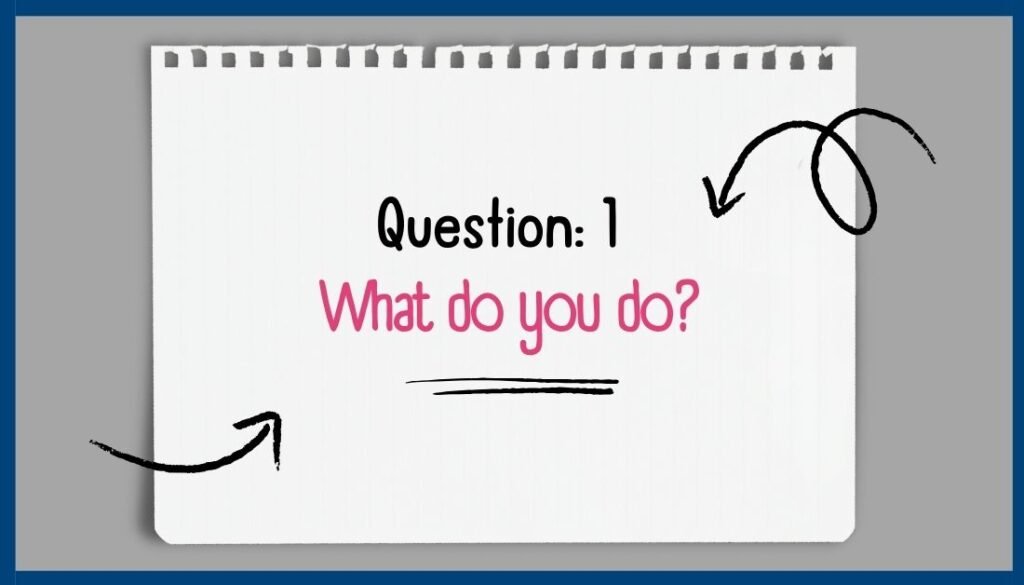
This is asking about your everyday activity, right? Whether you work or study or if you are a homemaker. So let me give you an answer for each one of those:
What do you do? (Work)
Answer: The first one about work, “What do you do?” I work as a teacher actually in a local secondary school. I teach English and I’m responsible for developing the new curriculum there.
Vocabulary: I work as a _____
So notice whatever your job, you can say I work as a teacher, as a plumber. I work as a____. Think of it as a chunk. For example, 1. I work as a. Sounds Portuguese. 2. I work as a teacher.
Vocabulary: I’m responsible for ___
Great. Notice also when you’re talking about your duties, and what you have to do. I’m responsible for something, but the for becomes fuh. I’m responsible for this, for that, I’m responsible for that.
What do you do? (Study)
Answer: Let’s imagine I’m a student. “What do you do?” Well, I’m a full-time student at university and I’m studying French and Japanese. And after graduation, I really want to get into translating. I think it’s a fascinating field.
Vocabulary: to get into____
Here, is an interesting phrasal verb. To get into something is… Means to get involved in a field of work or an activity. So it’s to get into, plus the noun. For Example: 1. You can get into translating, You can get into writing, You can get into politics, You can get into law, any of those.
What do you do? (Homemaker)
Answer: I’m a stay-at-home parent actually. So I look after the kids, get them ready for school and that. And I also do some volunteering work in our local community.
Vocabulary: Stay-at-home___
Stay-at-home: You can have a stay-at-home dad, a stay-at-home parent, a stay-at-home dad, stay-at-home mum. So this is somebody who basically looks after the home rather than going out to work. So they’re not paid to go out and work.
Vocabulary: volunteering work___
The other one, other kind of work was volunteering work. So volunteering work is like working for a charity, to give your time for free so you can help out in the local community. [ielts speaking common topics with answers]
Question 2: Do you like your job?
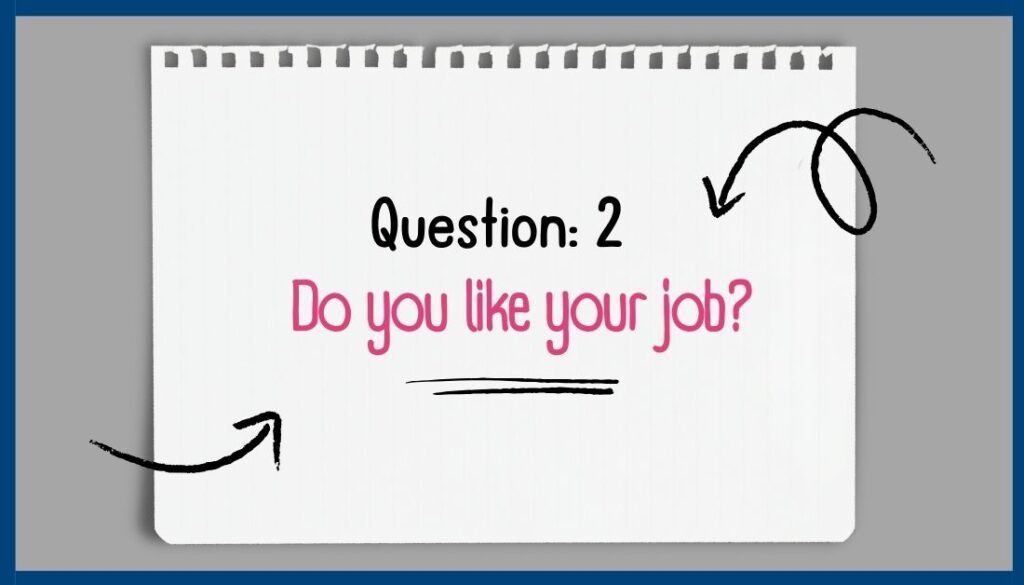
Answer: Yes, I like it most of the time. I mean, I really enjoy seeing my students learn and make progress, but I must admit the hours are long and work often eats into my personal time.
Vocabulary: Most
Notice the word stress here. I said I liked it most of the time. When we stress a word like this, it’s often as a contrast. So here I’m contrasting not all of the time, but most of the time. So use the word stress to really convey your meaning.
Vocabulary: I must admit___
Another expression, I must admit. So when you are giving an idea and then you want to make a contrast and say. This phrase is used to make a contrast similar to ‘but’ or ‘to be honest’. For example, I like this, but I must admit this is not so good. The hours are long, right?
Vocabulary: to eat into
The final phrasal verb is interesting to eat into. It means to take up or use up ( time, resources, profit or money)
For example: work eats into my free time meaning It’s like it’s eating away. Sometimes I want to study, but my family eats into my study time.
Question 3: What job would you like to do?
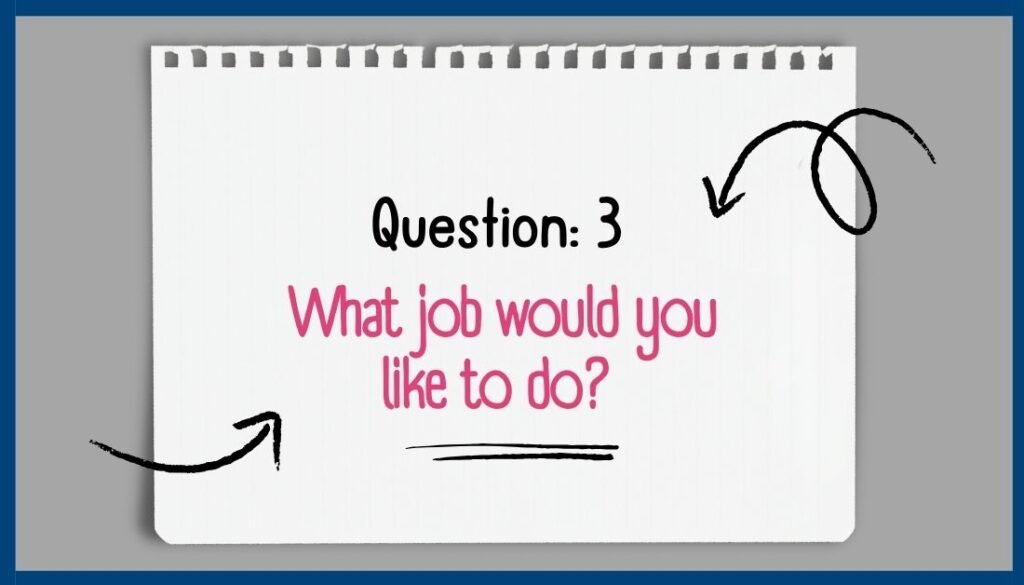
Answer: I haven’t really thought about that very much. Maybe a pilot? I think it’d be exciting to learn how to fly. Not to mention to have a chance to travel around the world.
Vocabulary: I haven’t really thought about that
This is one of those time fillers. It’s a bit like, that’s a tricky question. Hmm, let me think. I haven’t really thought about that.
Vocabulary: it’d be exciting
It would be exciting because it’s a conditional. Notice the contraction. It would be, it’d be. It’d be. It’s a great chunk. Think of the sound as a chunk, right? It’d be. It’d be. Try pronunciation: It’d be, It’d be exciting, it’d be funny, it’d be interesting and so on.
Vocabulary: Not to mention
Meaning: and also, and what’s more, and on the top of that, when you want to emphasise something you’ve said and give it more importance. When you say so it means this is good. And also this would be great. For example, So learning to fly would be good. Not to mention, to have a chance to travel around the world. [ielts speaking common topics with answers]
Question 4: What do you study/ what are you studying at the moment?
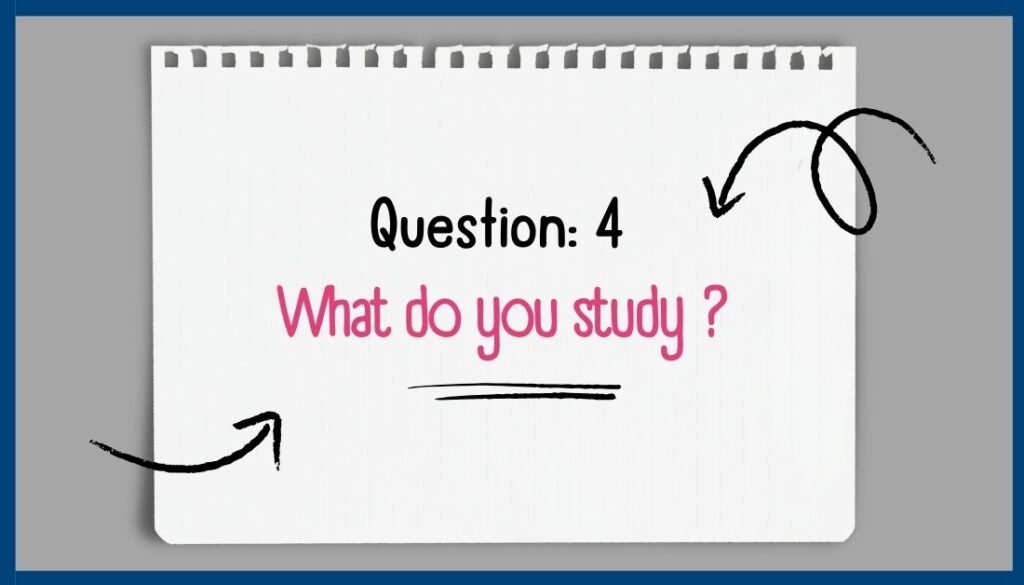
Answer: Right now I’m doing a master’s degree in accounting. It’s a part-time degree as I’m working as well. So it’s always a balancing act between work and study. But I can just about manage it.
Vocabulary: it’s a balancing act
It could mean saying that studying and working at the same time, doing a master’s degree whilst you’re working, it’s a balancing act. It’s a lovely idiom to use. It literally means you’re balancing two activities, two requirements, or two demands. So it’s a balancing act between work and study.
Vocabulary: Just about
Just about means it’s kind of almost or nearly, but it’s when you are successful. Explanation: It doesn’t mean nearly, but I didn’t. It means nearly and yes, I succeeded. But not very easily, just about. I just about manage to do it. Next question.
Question 5: What kind of accommodation do you live in?
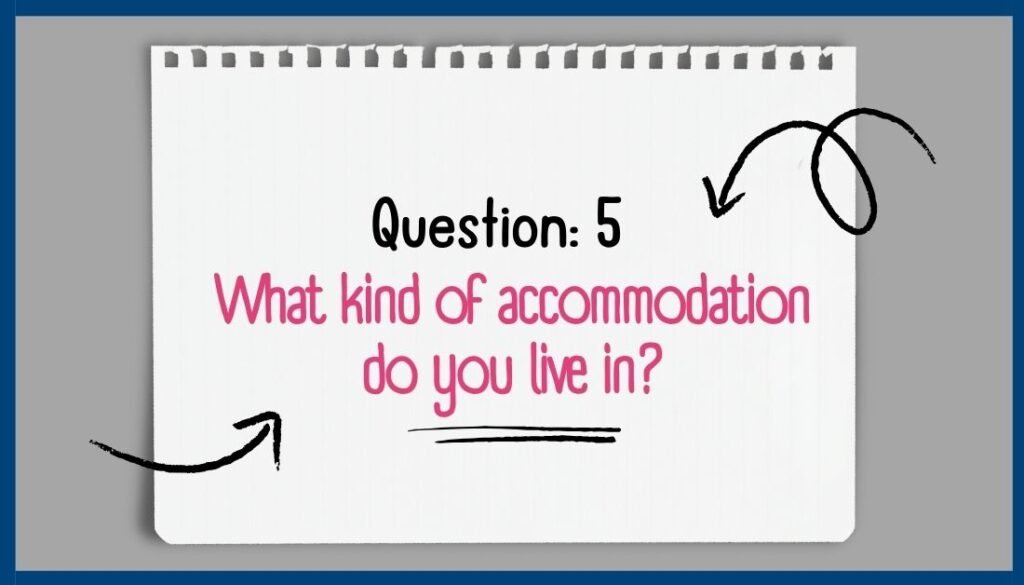
“What kind of accommodation do you live in?” The examiner is asking you about your house, your flat, and what kind of accommodation.
Answer: Actually I live in a flat, and it’s slap bang in the centre of town. It’s a basic two-bedroom apartment, with a nice kitchen, and one bathroom. And yeah, it has all the main mod-cons.
Vocabulary: slap bang in the centre
Slap bang in the centre means right, right in the centre of town.
Vocabulary: all the main mod-cons
This actually stands for modern conveniences referring to heating, hot water, air conditioning, television, and things that make your life more comfortable.
Question 6: Which part of your home do you like most?
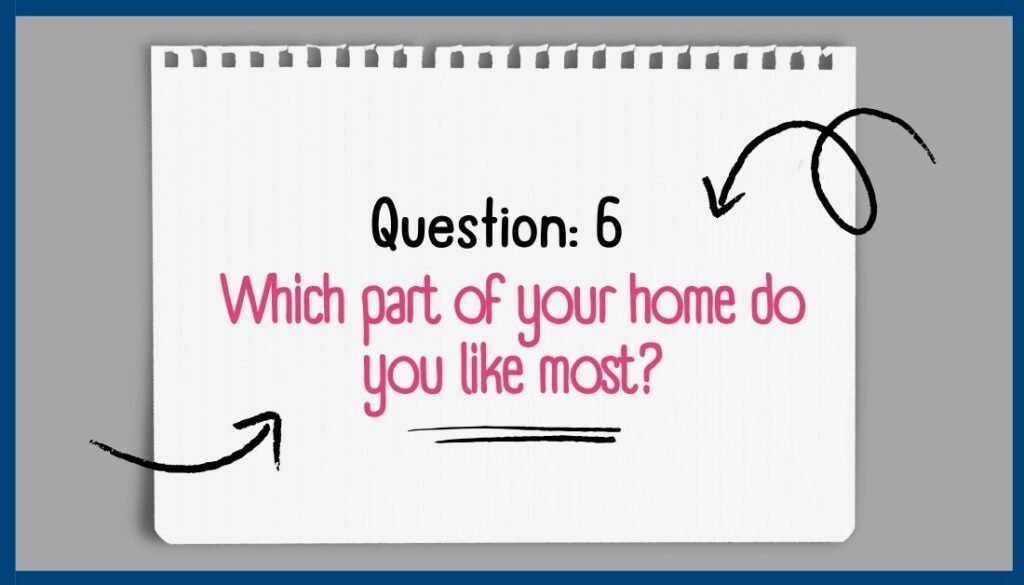
Answer: I’d have to say the lounge. There’s a really comfy sofa there and that’s where I chill out and spend most of my downtime, as well as watch TV with my family.
Vocabulary: comfy
Comfy means: comfortable.
Vocabulary: to chill out
To chill out means to relax.
Vocabulary: spend my downtime
This means the time that you’re not working, basically your free time is your downtime. Downtime can be for people or machines. So when something’s not working, that’s the downtime. [ielts speaking common topics with answers]
Question 7: What do you do in your free time?
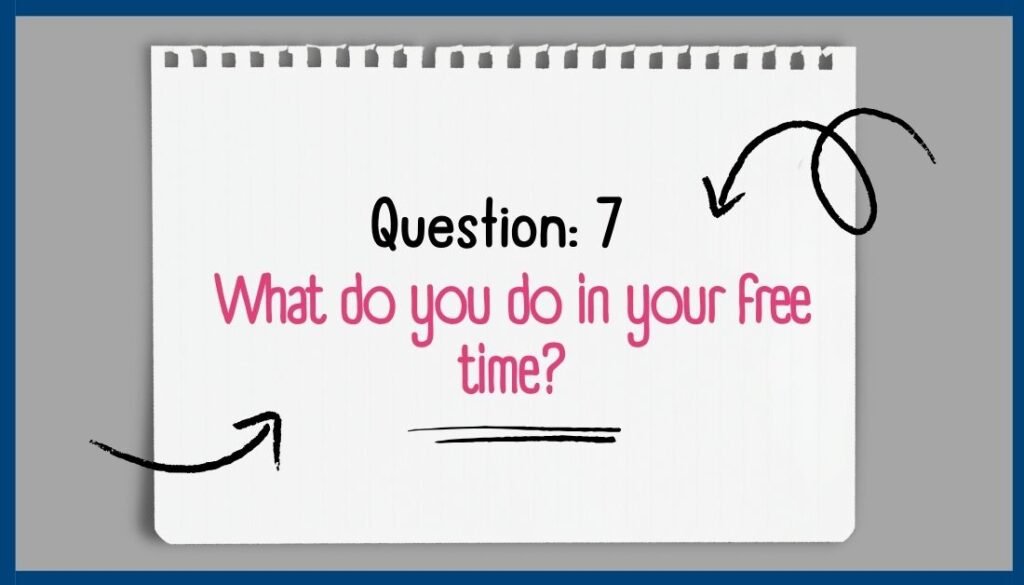
Answer: Well, actually I’m a bit of a film buff, so I watch lots of movies, but apart from that, I also like to go down the gym and work out on the treadmill and to do some weights there whenever I have free time.
Vocabulary: a Film buff
A buff is a fan or an expert in something. We don’t use this with everything, but I think more typically we can say a film buff, a movie buff, a history buff, a computer buff, maybe a car buff. So you like something and you have a lot of knowledge about it.
Vocabulary: but apart from that ___
Now this actually means in addition to as, well as. For example, So I watch movies, as well I go to the gym, but apart from that, I also go to the gym.
Students also read: 9 Common Mistakes in IELTS Speaking Test
Question 8: Do you prefer to spend time with friends or family?
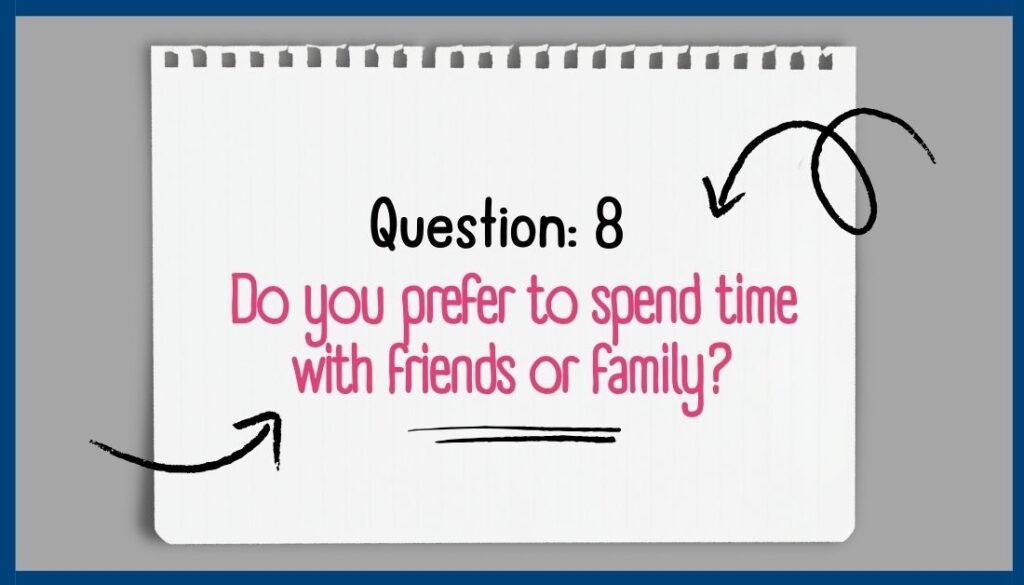
Answer: That’s hard to say. I enjoy spending time with both to tell you the truth. I’d probably say, overall, I strive to spend more time with my family, and I guess that means, yeah, sometimes I do neglect my friends.
Vocabulary: to tell you the truth.
To tell you the truth is just… It’s a filler and it means to be honest or speaking frankly.
Vocabulary: to strive
To strive means to try hard to do something. For example, I strive to spend time with family.
Vocabulary: to neglect
Neglect here means to ignore or not pay attention to. [ielts speaking common topics with answers]
Question 9: What’s your morning routine?
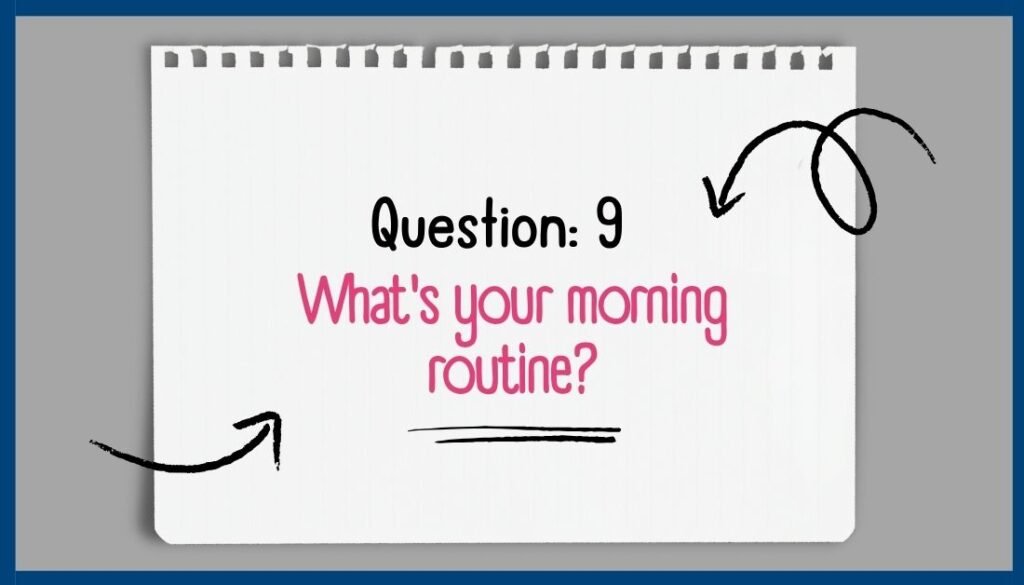
Answer: Well, I aim to get up at seven o’clock then I go for a brisk walk every morning without fail. Then, when I get back, I tend to have breakfast on my own because everyone’s asleep and after that, I start work.
Vocabulary: go for a brisk walk
A brisk walk means a quick walk.
Vocabulary: without fail
Without fail: means every day like religiously.
Vocabulary: tend to
Mostly to talk about routines we use ‘tend to’ For example, I typically do this every day is means the same. Instead of saying ‘I everyday do this’, you can say I ‘tend to.’
Question 10: How do you stay fit and healthy?
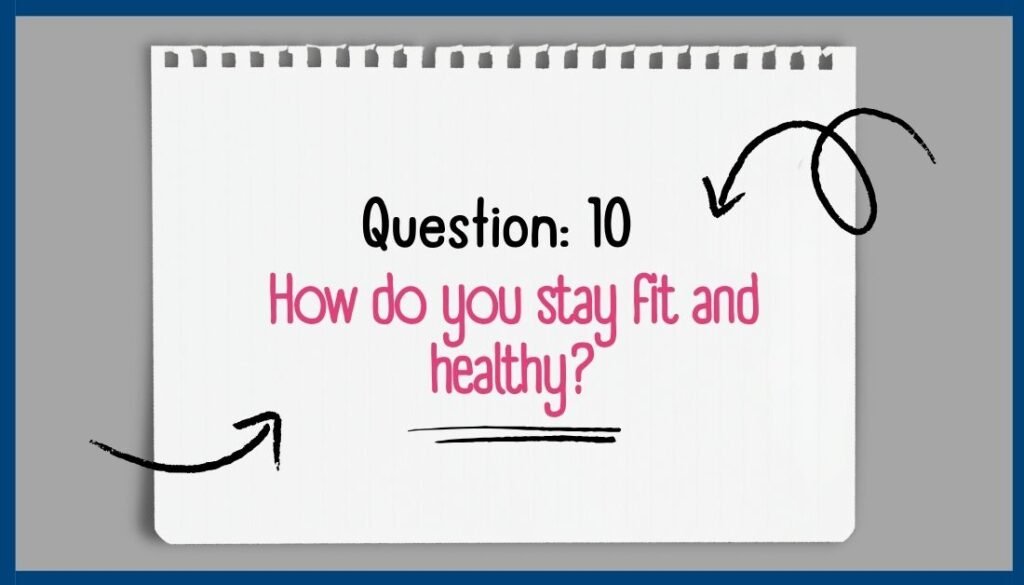
Answer: As I mentioned before, I like to work out at the gym. On top of that, I do take care with what I eat. So I like to cook healthy food at home, plenty of vegetables, we eat meat in moderation and I try to eat a piece of fruit every day.
Vocabulary: As I mentioned before,
This is quite a straightforward question to answer. If it’s a question that you’ve already answered before in the test, then just say as I mentioned before, but don’t repeat the same answer, develop the answer in more detail or take a different path. For example, As I mentioned before, I like to work. On top of that then develop your answer…
Vocabulary: to take care of
To take care of is to look after, but to take care with something is to pay attention to and be careful with.
Vcaobaurly: to do something in moderation
To do something in moderation means not too much, not too little, just medium. So you should eat meat in moderation. Drink alcohol in moderation. [ielts speaking common topics with answers]
Question 11: Did you do any sports as a child?
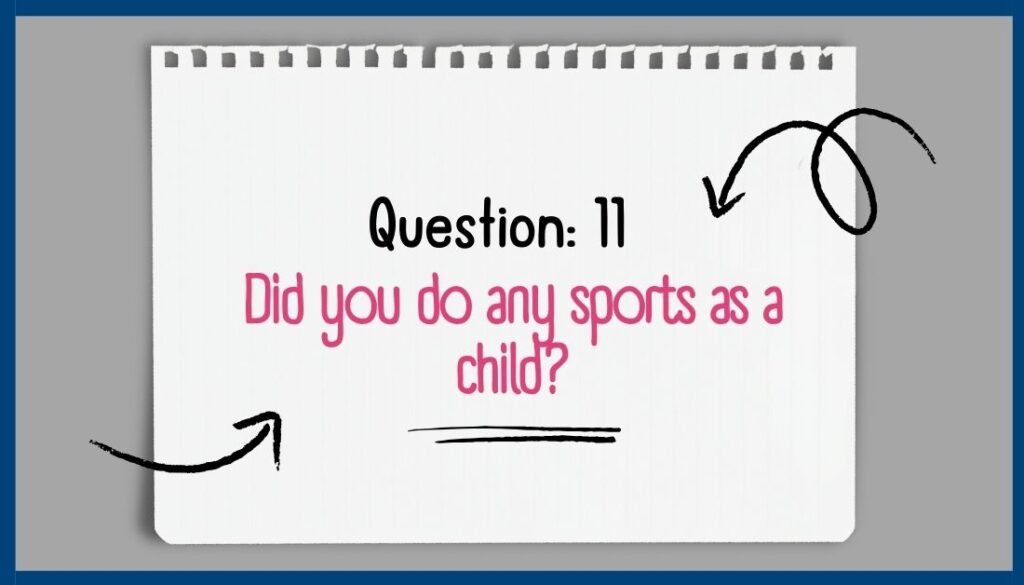
Answer: Yes, we used to play football at school. That was the main sport. Although I also played cricket in the summer, but I wasn’t very good at it at all. I never really got the hang of it.
Vocabulary: Used to___
So the question’s in the past. There are different ways you can talk about the past. “We used to play football.” Notice it’s used to. (We used to play football)l, simple past. “I also played cricket,”
Vocabulary: to get the hang of something
The nice expression. To get the hang of means: it is to learn how to do something. Often something kind of technical or some kind of technique. For example, to get the hang of driving, I got the hang of skiing or of water skiing, that kind of thing.
Question 12: What kind of music do you like?
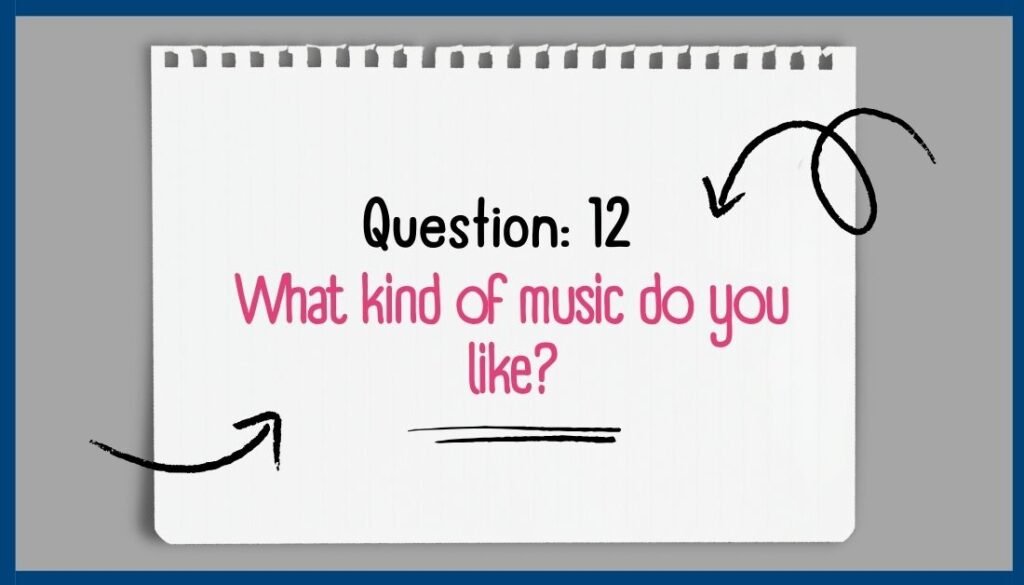
Answer: All sorts, to be honest. I used to be really into jazz, but nowadays I tend to listen to more classical music. I find it good for studying and relaxing and I often put some on in the background when I’m working.
Vocabulary: All sorts
All sorts mean: all kinds. If you like different kinds of music or sport, you can just say all sorts. All sorts mean all kinds.
Vocabulary: Used to/Nowadays
So there are two ways of answering. I said that I used to be into jazz, but nowadays I tend to. So you can contrast the past and the present.
Vocabulary: I find it
I find it mean I think it is. It’s nothing to do with finding your money or your keys. It means, I think it is. Example sentences:
- I find it interesting.
- I think it’s interesting.
- I find it good for studying.
- I think it’s good for studying.
It’s a really nice natural conversational way of saying, I think or I think it is something. I find it good for studying.
It’s a really nice natural conversational way of saying, I think or I think it is something. I find it good for studying. [ielts speaking common topics with answers]
Question 13: What’s your favourite kind of weather?
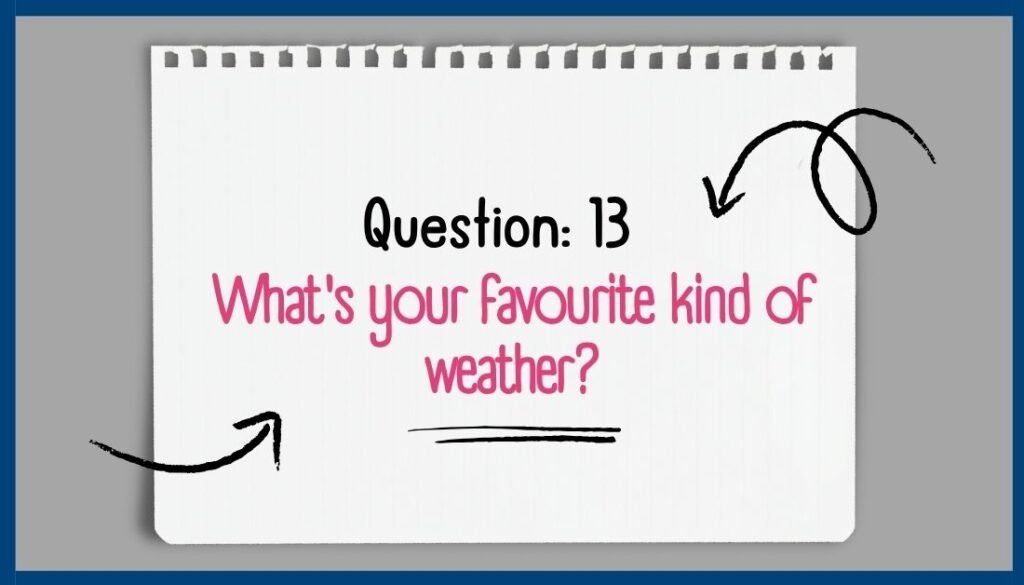
Answer: Well, I actually like cold weather and I love it when it snows. So long as I’m wrapped up warm, I love to go out in the snow and if my daughter is up for it, we will go and make a snowman together.
Vocabulary: I love it when ___
Do you remember? We just looked at the phrase, “I find it”. So this use of it is very common in in conversational English. I love it when something happens. Learn that chunk with these example sentences:
- I love it when…
- I love it when you say that
- I love it when you do that.
- love it when it rains.
- I love it when it snows
Vocabulary: Wrapped up warm
Wrapped up warm means to put on warm clothes. Maybe your jacket, hat, scarf, gloves, et cetera.
Vocabulary: To be up for something
It’s a great phrasal verb. To be up for something means you are ready and willing to do something.
For example: Are you up for dinner tonight? Yes, I’m up for dinner. (I’m ready and willing).
Question 14: Which city would you like to visit in future?
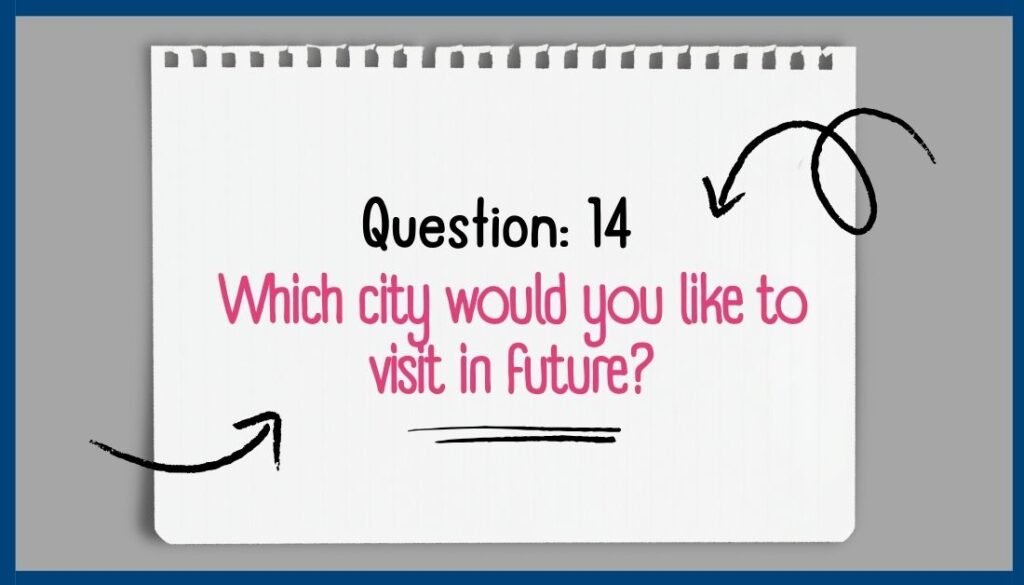
Answer: Well, there are so many, but if I had to choose one, I’d say Lima in Peru, and maybe one or two other neighbouring cities. I’ve never been to South America, but I’ve seen so many breathtaking pictures of Peru. I think that’d be my top choice.
Vocabulary: if I had to choose one, I’d say
So it’s kind of conditional, hypothetical. This expression can be used when you make a choice or you are not sure what to choose. For example: What’s your favourite sport?” Well, I don’t know. I mean, if I had to choose one, I’d say football. So it is very natural and conversational.
Vocabulary: Neighbouring (adj.)
Neighbouring means nearby. So a neighbour is somebody who lives next door, but neighbouring as an adjective means nearby.
Vocabulary: that’d be
That would be, you can naturally say that’d be. Get that chunk or that sound, that’d be. That’d be my top choice. [ielts speaking common topics with answers]
Question 15: Are clothes important to you?
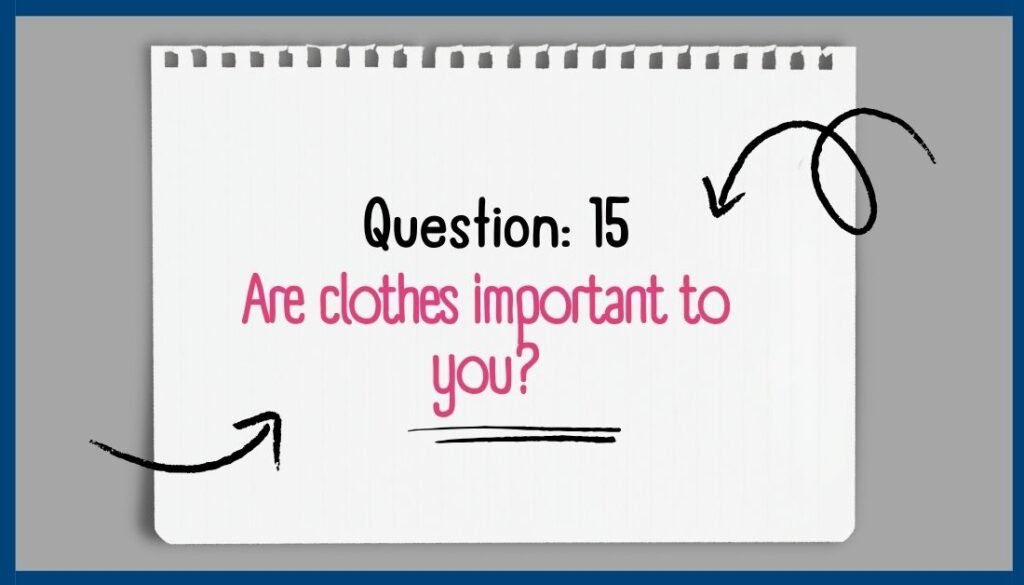
Answer: If I’m gonna be honest, not really. I don’t think I’m fashion-conscious at all. I mean, for me, clothes are just, well, something practical. So long as I look neat and tidy, then that’s fine. You know, I don’t pay much attention to coordinating colours or wearing the latest style.
Vocabulary: If I’m gonna be honest
If I’m going to be honest, right? Which basically, to be honest, but you can make it bigger. If I’m going to be honest. To tell you the truth.
Vocabulary: at all
At all is used to make a negative stronger. Example sentences:
- I am not happy at all.
- I don’t like it at all.
Vocabulary: to be neat and tidy
Neat and tidy means clean, well-presented, and nothing messy.
Conclusion
Great. So there you go, 15 of the most common IELTS speaking common topics with answers] Remember, do not learn these answers and try and memorise them. It’s a waste of your time. I want you to learn the chunks, the phrases, the vocabulary and then make your own answers.
So, it’s like learning to dance. You need to learn the basic steps and then you can start to improvise and dance. You don’t dance by memorising the steps and just copying them. You have to learn the movements and then you can dance to the music. And that’s what I want you to do with your speaking.
I hope you found this article helpful. If you have any questions or if there’s a specific topic you’d like me to cover in the next article, feel free to leave a comment below.
Students Also Read: Best Way to Improve IELTS Speaking Score | 7 Tips and Tricks